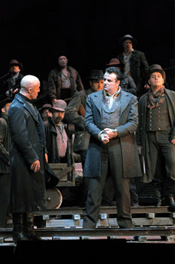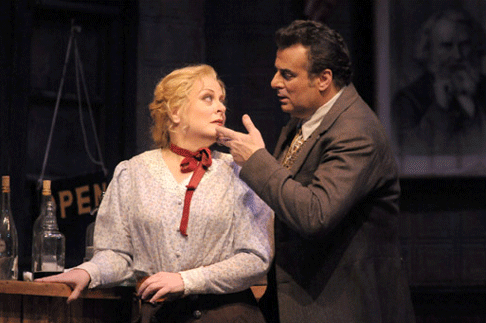02 Feb 2011
La Fanciulla in its Anniversary at Lyric Opera of Chicago
In its current production of Giacomo Puccini’s La fanciulla del West Lyric Opera of Chicago celebrates the centenary of the first performances of the opera.

In its current production of Giacomo Puccini’s La fanciulla del West Lyric Opera of Chicago celebrates the centenary of the first performances of the opera.
As elsewhere during the past year Deborah Voigt sings the role of Minnie, who manages the Polka tavern in a California mining camp. The man who wins her heart, and is identified alternately as Dick Johnson or Ramerrez, is sung by Marcello Giordani. The baritone Marco Vratogna, in his debut at Lyric Opera, takes on the role of Jack Rance, the Sheriff who also develops an emotional attachment to Minnie. Sir Andrew Davis conducts with enthusiastic vigor the Lyric Opera Orchestra.
 Marco Vratogna as Jack Rance and Marcello Giordani as Dick Johnson (Ramerrez)
Marco Vratogna as Jack Rance and Marcello Giordani as Dick Johnson (Ramerrez)
In the brief orchestral prelude to Act I Davis emphasizes sweeping gestures
with hints of the West looking toward the action of the opera. Credit must be
given to the ensemble of performers making up the cast of miners in the opening
scene. Under the direction of chorus master Donald Nally members of the Ryan
Opera Center executed both solo and group parts convincingly in their dramatic
and vocal involvement. The tavern is first depicted as a relatively dark set
with painted flats or backdrops signifying the California mountains of the 1849
Gold Rush. Once the miners are gathered inside the Polka, the set brightens and
the stage is devoted to an appropriately busy series of exchanges. The
manipulative bartender Nick, here portrayed and sung with just the right amount
of dash by David Cangelosi, proclaims, “Whisky per tutti;” all then
settle to hear a nostalgic ballad sung by the character Jake Wallace, movingly
performed by Paul Corona. When an argument erupts over a game of cards, only
the intercession of Sheriff Rance halts the possibility of further violence.
Mr. Vratogna cuts an imposing figure as Jack Rance, his snarling demeanor
commanding respect as he tosses off lines with angry menace. Vratogna’s
declamatory force is more effective than his lines in the middle register of
his vocal range, where he seems to depend on a recurring tremulous approach.
Yet even Rance is not immune to a good fight, as one breaks out against a miner
who vies — like the Sheriff — for the love of Minnie. In her first
dramatic entrance, accompanied by pistol shots, she indeed stops the fight and
settles any confusion brewing in her saloon. Ms. Voigt proves herself
comfortable in the role of Minnie. She is able to combine swagger, as she
tosses back a drink, with the mothering care she feels for the miners. Further,
Voigt invests her character with a tender emotionalism , as she explains to
Rance what she hopes to find in love with an ideal partner. In the only solo
part of this act which could be deemed an aria for Minnie, Voigt states her
case movingly if at times with some insecurity in notes that are taken
forte. Soon after her statement the figure identifying himself as Dick
Johnson enters the tavern, and their emotional bond develops in an extended
scene of dialogue and shared lyricism. Mr. Giordani fulfills the vocal demands
of the role admirably in his abilities to sing at varying expressive levels
while shading his voice to emphasize his character’s personality. In the
identity of Ramerrez he is, of course, the leader of a criminal gang who
collectively plan to rob Minnie’s tavern. The love which springs up in
their scene together causes Dick/Ramerrez to abandon this plan as Minnie
declares at the close of the act that she guards the gold belonging to the
miners. Whoever wants it will first have to kill her.
 Marcello Giordani as Dick Johnson (Ramerrez) and Deborah Voigt as the Girl
Marcello Giordani as Dick Johnson (Ramerrez) and Deborah Voigt as the Girl
In Act II Dick has responded to an invitation to visit Minnie at her cabin. At the opening Minnie’s Indian maidservant agrees that she will follow the moral suggestion of her mistress and marry the father of her young child. She helps Minnie to change into more domestic attire and withdraws to her teepee following the introduction of Dick’s visit. At first Minnie resists Dick’s advances, then she surrenders yielding to him her first kiss. Because of the falling snow Dick is allowed to stay the night and is given space at a respectable distance. When the Sheriff and his guard awaken the pair, Dick hides during a confrontational scene in which Minnie must accept the news of her lover’s criminal association. Once they are again alone, Minnie releases her bitter resentment in a series of outbursts that show Voigt in her best form of the performance. Her top notes are convincingly delivered with the stirring communication of a deceived soul. Despite Dick’s touching self-defense Minnie forces him out of the cabin, where his is wounded by the law. When Jack Rance returns and discovers his bleeding prey returned to Minnie’s protection, a card-game determines the hero’s fate. In her well-acted stint at poker Voigt proves Minnie’s devotion to Dick by cheating and, when left alone, casting her bogus cards into the air to celebrate her win.
The short Act III of Puccini’s opera provides resolution of both emotions and individual characters as portrayed. When Dick is caught by a posse and threatened with punishment by hanging, he begs that Minnie not be informed of his shameful death. Giordani’s aria as the tenor’s highlight of this performance is an impressive appeal to spare the feelings of his beloved. Minnie’s entrance while riding and plying a mining cart is as show-stopping as her pistol shots in the first act. At the same time, her sincere reminders now that Dick has been blessed by God, who has changed him, recalls her readings from the Bible in that opening scene. She succeeds through dint of her persuasive tone in freeing the reformed Dick. As they look forward to a life elsewhere, Voigt and Giordani sing a stirringly united “Addio” to California and the Sierras.
Salvatore Calomino